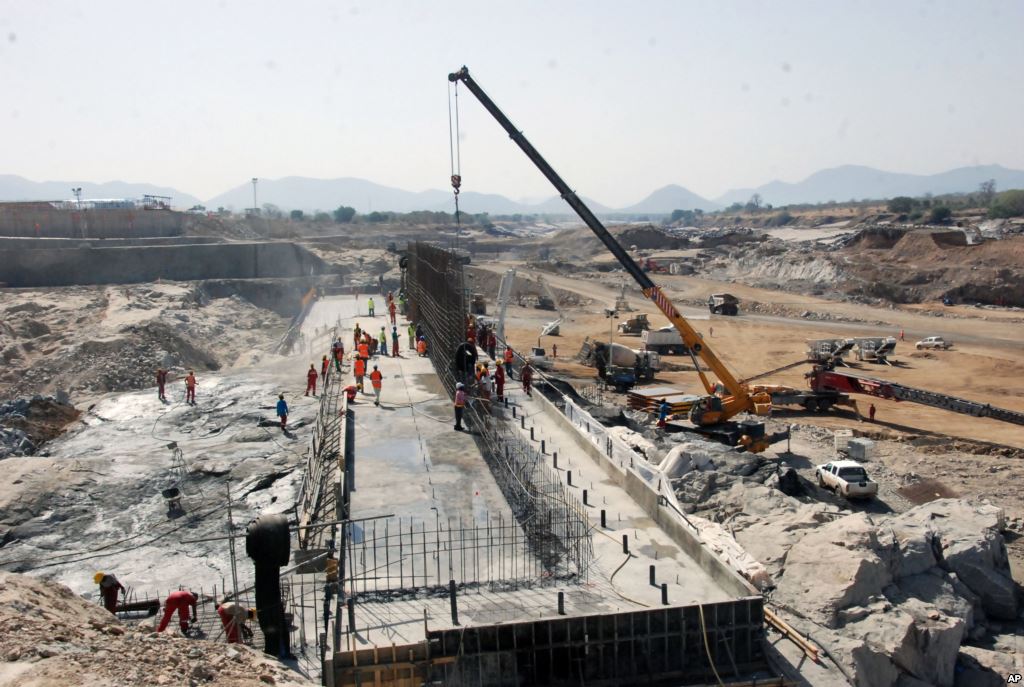By Betre Yacob.
Egypt has begun a new diplomatic campaign against the multi billion dollar dam Ethiopia is constructing over the blue Nile, as Ethiopians are preparing to celebrate the 3rd year anniversary of the project.
The campaign came after a technical negotiation between the two countries failed early this month.
Citing an unnamed source, Al-Monitor, a popular Egyptian news website reported that the new campaign launched by Cairo aims to convince the international community to exert pressure on Ethiopia to stop the construction of the dam.
“More negotiations with Ethiopia only waste time and directly threaten Egypt’s water security. We realized that Ethiopia doesn’t want any genuine solutions to end the crisis, but is only trying to portray Egypt as approving of the dam’s construction to facilitate access to funding”, the source told Al-Monitor.
According to Al-Monitor, the campaign is led by a team comprised of government officials including water and Irrigation minister, scholars, and public figures. The team has a plan to discuss with all western powers, which are supposed by Cairo to be major players behind the dam.
Ethiopia has begun the construction of the dam, Ethiopian Renaissance Dam, in April 2011. The dam is the biggest in Africa. It is expected to generate 6,000 MW power when it is completed in 2017.
Ethiopia hopes the dam will solve the country’s power shortage and lift its people out of poverty.
According to official reports, 30 percent of the dam has been completed so far.
The relation between Ethiopia and Egypt has been full of tension, mistrust, and anxiety, since the beginning of the construction of the dam.
Egypt sees the dam as a national threat. It seeks Ethiopia to halt the project, claiming it will reduce the amount of water flowing into its territory.
However, Ethiopia has frequently made clear that it will not stop the construction even for a second. It argues that there will not be any harm against Egypt and other riparian countries.
“No Threat”: Independent Panel of Experts
Although Egypt sees the Ethiopian Renaissance Dam as a national threat, independent panel of experts has made clear that the dam will not have any significant harm against Cairo.
The Independent panel of experts was formed in 2012 by Ethiopia, Egypt and Sudan to investigate the dam’s potential risks.
According to the report of the experts, the dam even offers major benefits not only to Ethiopia but also to Egypt increasing the useful lifetime of its dams by reducing silt deposits.
The report also indicates that as the dam is to be built in a deep gorge, the water exposure to sunlight is low, and it also minimizes the amount of water lost in evaporation.
Historical Right and Colonial Agreements
Egyptians believe they do have a historical right to use the water alone. They accuse Ethiopia of violating this right and two treaties made during the colonial period, in 1929 and 1959.
Ethiopia rejects the accusations. It claims that the treaties are not binding because it didn’t sign them.
Laying on the principles of mutual benefits, the country argues that Egypt should amend its zero sum policy and come to cooperation for mutual benefit.
The 1929 and 1959 colonial agreements were made excluding Ethiopia. The first one was signed between Britain and Egypt. And the later was also made incorporating Sudan.
The two agreements have allocated 55.5 billion cube meters of water (or 85% of the Blue Nile water) to Egypt, and 18.5 cubic meters to Sudan.
According to the treaties, the upper stream countries including Ethiopia are prohibited from using the water.



